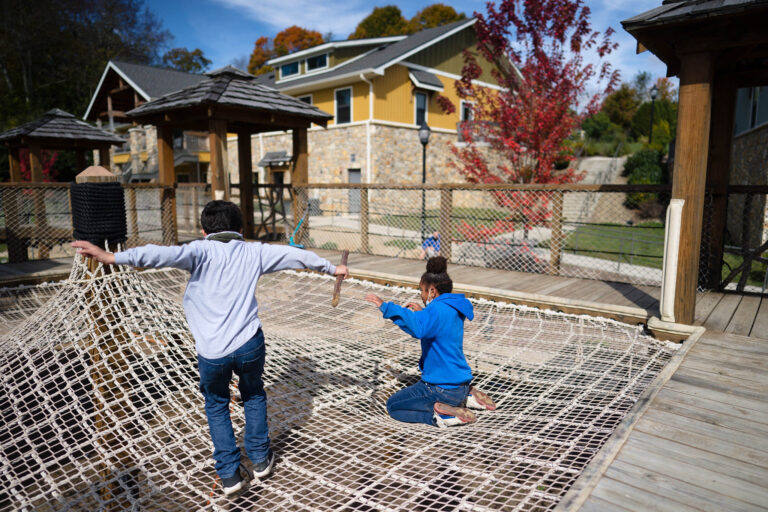 This article was written by Meredith Martin, Crossnore’s Director of Program Excellence. Meredith has her Master’s degrees in Social Work and Divinity is also a Licensed Clinical Social Worker Associate and outpatient therapist on the Winston Salem campus.
This article was written by Meredith Martin, Crossnore’s Director of Program Excellence. Meredith has her Master’s degrees in Social Work and Divinity is also a Licensed Clinical Social Worker Associate and outpatient therapist on the Winston Salem campus.
First Corinthians 13 is a scripture that most of us know well. It is read at most weddings, and although it is fitting for marriage, Paul wasn’t writing to a married couple. When he wrote 1st Corinthians, it was to a hurting church – a group of people in conflict. There are several different terms for love in the Greek. Eros is a passionate, romantic love. Phileo love is the type of love we shared a few years ago when the Panthers were in the Super Bowl, and everyone was united in love for one another for a common purpose – Go Cats! It is a warm, sentimental love shared between friends and family. But the love that is talked about in 1 Corinthians 13 is a different kind of love altogether.
Agape love.
Agape love is sacrificial love – the most noble and powerful type of love there is. It is not the love you hear about in a romantic movie or in an iconic love story. As they say on “This is Love,” a podcast I often listen to, agape love stories are “stories about how we wander around being vulnerable and then do something daring.” We want to hear these kind of love stories – about others sacrificing because of their love for someone else.
The swimmer and the whale.
There is a story of Lynne Cox, a 17-year-old champion swimmer who, by that age, had already swum the English Channel. TWICE. One morning she was swimming in the 55-degree waters of the San Francisco Bay. As she was finishing the final part of her swim, she realized that a baby gray whale was swimming along with her. Lynne had already been swimming for more than an hour and her body needed to rest, but after the whale had swum with her for over a mile, it was clear that if she continued and swam to shore, the baby whale was going to follow her and get itself into life-endangering trouble. The baby whale needed its mother for rest and food, and Lynne was determined to help reunite them. Lynne continued swimming for hours, in the cold and dangerous waters, until she finally found the calf’s mother and reunited them.
Many might wander, “What was she thinking, putting herself in such danger and sacrificing, possibly even herself, for an animal?!” But this is what agape love looks like – sacrificial love for another one of God’s creatures.
Love is patient. Love is kind.
 When Paul describes love as patient in this chapter, it may not be the kind of patient we’re thinking of. We often think of patient as “passively waiting,” but this is not what he’s talking about. Patient here – or makrothymeo in the Greek – means to persevere patiently and bravely in enduring misfortunes and troubles; to be long suffering; to be slow to anger. This type of patience makes me think of prisoners of war, survivors of the Holocaust, or people going through long term medical treatments.
When Paul describes love as patient in this chapter, it may not be the kind of patient we’re thinking of. We often think of patient as “passively waiting,” but this is not what he’s talking about. Patient here – or makrothymeo in the Greek – means to persevere patiently and bravely in enduring misfortunes and troubles; to be long suffering; to be slow to anger. This type of patience makes me think of prisoners of war, survivors of the Holocaust, or people going through long term medical treatments.
When Paul describes love as kind, the Greek really emphasizes that kindness is “showing one’s self mild” or “being measured in demanding our own needs.” Agape love is not about focusing on myself at all. Truly “kind” love puts the other’s need above my own. Paul goes on to say that loves “bears, believes, hopes, and endures.”
I have worked in social work ministries for many years, and if there is any group of people who embodies this type of love, it is foster and adoptive parents.
Some things are more important.
Last month I had the opportunity to meet a couple who had gone through training to become foster parents with Crossnore. They already had two biological children of their own. As they were going through the long, arduous process of getting licensed, they became aware of a sibling group of five (5!) who was eligible for adoption. These siblings were living on our campus, and this couple and their two children opened themselves up to loving them. Just before Christmas, they got the all clear to bring these new children home.
They were overjoyed, but the timeline wasn’t great. A year earlier, before any of this, they had booked a Disney Cruise for their family of four. The cruise was scheduled for the time when the sibling group was set to move out of residential care and into their home. They were unable to add five new passengers to the trip and could not get their money back for the four tickets they had already purchased. They prayed.
The day I met them at the Crossnore, I had the privilege of watching them drive out of the parking lot in their two new huge vehicles to pick up their kids and take them home. Their mom said, “There will be time to go to Disney. This is more important.”
The reality of foster care.
Today there are nearly 13,000 children in foster care in North Carolina. They would nearly fill the LJVM coliseum in Winston Salem. All of them have experienced neglect or abuse. Unfortunately, not all of them are as lucky as that sibling set of five. We have a major need in our state for more foster parents. Sometimes children just need a place to stay for a few weeks or months. Sometimes they need a forever home. But they ALL need us.
A lot of adults say, “I could never be a foster parent. It would be too hard. I would fall in love with that child and they might get taken away.” But agape love doesn’t focus on one’s own needs. Sometimes we let the fear of losing what love gives us deter us from giving that love to someone else.
Loving each one.
 One of the departments I supervise at Crossnore is Admissions and Referrals. Each week we receive more calls for placement for children than we can accommodate. Many times we don’t know where they end up. I pray each day they will find somewhere that shows them agape love.
One of the departments I supervise at Crossnore is Admissions and Referrals. Each week we receive more calls for placement for children than we can accommodate. Many times we don’t know where they end up. I pray each day they will find somewhere that shows them agape love.
Foster care and adoption are not for everyone. It is not always pretty or easy or fun. And agape love that’s talked about in 1 Corinthians 13 is exactly what it requires. Paul invites us to “bear all things, believe all things, hope all things, endure all things.” The word for “all” there is “pas.” It can also be translated as “each one.”
As we think about each beloved child of God in foster care, what would it look like for us to bear or persevere with each one, believe in each one, hope in each one, endure for each one? Maybe you are not called to love all of them. But maybe you are called to love just one.
Many people say they could never love like this. But that’s how God loves us. And it’s exactly how He calls us to love others.
To find out more about foster care and adoption, visit www.crossnore.org/foster-care-adoptions.



